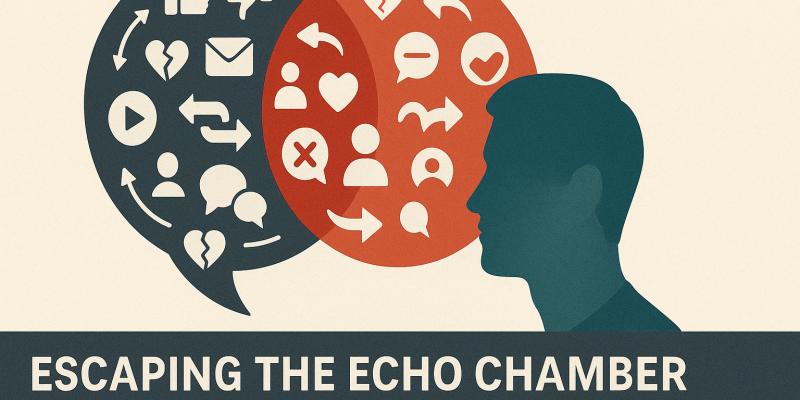Escaping the Echo Chamber: A Hidden Risk to Men’s Mental Health
STORY / 04.08.25 / 2 min read
by Tom Garber

What Are Echo Chambers, and Why Do They Matter for Men?
An echo chamber is what happens when the content you see online keeps reinforcing what you already think, feel, or fear, while blocking out other perspectives. On social media, algorithms are designed to feed us more of what we engage with. That can mean more connection… but it often means more isolation.
And for many men, that isolation doesn’t always look obvious.
It looks like being stuck in a loop.
Men searching online for answers, about anger, purpose, relationships, confidence, or masculinity, are often served content that validates their confusion or frustration, but rarely offers depth or healing.
Instead of therapy, they get shortcuts.
Instead of community, they get ideology.
Instead of growth, they get reinforcement.
Research Confirms the Risk
Echo chambers are real, and powerful.
A large-scale study on platforms like Facebook, Twitter, and Reddit found that users consistently form insular clusters, where their own views are reflected back to them and opposing ideas are filtered out (PubMed).
And these clusters don’t just trap opinions, they intensify emotions.
Studies show that emotionally charged, homogenous groups (especially around identity and belief) increase polarization, distrust, and defensiveness over time (Cambridge University Press).
For men already feeling unseen, unheard, or unsure of where to turn, that becomes a dangerous loop.
How This Affects Men’s Mental Health
We are seeing more men take that first step toward support.
But when they don’t find safe, nuanced, or trustworthy guidance early on, they often turn elsewhere, not out of weakness, but survival.
Too often, that “elsewhere” is a content-driven echo chamber that rewards:
- Certainty over curiosity
- Anger over vulnerability
- Control over connection
In those spaces, men are told what they want to hear, not what they need to grow. They’re encouraged to armor up, not open up. And while it may feel empowering in the short term, it deepens the very isolation they came to escape.
How to Break the Echo Chamber and Train the Algorithm
Echo chambers aren’t fixed, they’re built by patterns. And patterns can change.
Here’s how men (and anyone) can reshape their digital world:
Follow voices that challenge and expand you - not just affirm you
Stay with long-form content - articles, interviews, deep conversations
Engage with nuance - like, comment on, or share posts that offer complexity
Diversify your feed - bring in voices from different cultures, experiences, genders
Pause before sharing - does this post speak from pain, or help process it?
Even small shifts in behavior teach the algorithm what matters to you.
Why It Matters
Echo chambers don’t just affect what we believe, they affect how we belong.
For men, especially those navigating stigma or emotional shutdown, the cost of bad information or shallow support is high.
To support men’s mental health, we don’t just need more content, we need better connection.
Spaces that offer trust, not tricks.
Depth, not dogma.
Conversation, not command.
At Hope for Men, we believe emotional healing starts with exposure to complexity, and the safety to explore it.
Selected Research
- Echo chamber dynamics across Facebook, Reddit, Gab, and Twitter (PubMed)
- Emotional and policy polarization in homogenous online groups (Cambridge University Press)
- Online information environment & risks to mental wellbeing (Royal Society PDF)